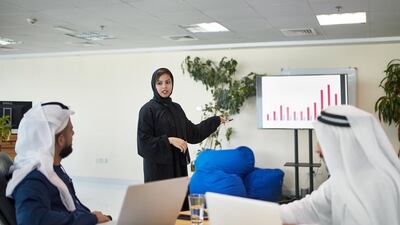“Never let a good crisis go to waste” is one of Sir Winston Churchill’s many memorable quips. Hackneyed though it may sound, it captures an important insight amid the turmoil caused by the Covid-19 pandemic. Identifying opportunities for change is of particular importance in the Gulf region, where every government had been pursuing an economic transformation long before the pandemic; witness, for instance, Saudi Vision 2030.
Covid-19 has further increased the urgency of diversification by underscoring the vulnerability of the “old” economic model. Attitudes about climate change are evolving rapidly and even the International Energy Agency recently called for a stop in all new oil and gas projects to meet the goal of net-zero carbon emissions by 2050.
Even if change can be neither fast nor total, the urgency of building future prosperity on non-oil drivers is clearly increasing. But this task is still complicated by the legacy of the past. Much of the private sector has channelled capital into low-productivity activities reliant on low-cost labour. While innovative ideas are cropping up with growing frequency, they remain relatively rare.
Covid-19 is making a difference by challenging past practices and assumptions and forcing companies to ask new questions. Lockdowns forced even smaller businesses to embrace technology as a pre-condition for survival, providing them with a critical link to customers and partners.
For the first time in the recent history of the Gulf, businesses have stepped away from their traditional labour bias by boosting investment in automation and digitisation, while numbers of low-cost foreign labourers have been declining. This is good news for productivity.
Moreover, companies have begun to seek new savings, synergies and opportunities by embracing energy efficiency, outsourcing and new distribution channels. There are also occasional signs of new partnerships and consolidation, which is welcome news for company growth and economies of scale. Such business model overhauls are critical for finally making productivity a key growth driver in the region.
Labour markets have been disrupted the world over but some of these changes hold particular promise for the Gulf. Technology adoption should improve the quality of jobs while also creating new employment opportunities. Jobs underpinned by higher productivity should prove more appealing and realistic for Gulf nationals.
But the crisis has also led employers to embrace technology as a way of enabling distance work. In many cases, this has not only ensured continuity but also enabled new kinds of flexibility by revealing concrete alternatives to the old model of full-time employment in a given physical location.
While it may be premature to comment on the future importance of distance work, choices made out of necessity have delivered many benefits. A reduced reliance on on-site work can help businesses scale back their real estate requirements and save money.
Employees can improve their quality of life by spending less time and money on commuting. While many companies now seem to be edging towards a hybrid model that combines distance work with the traditional model, employees are increasingly welcoming the lifestyle benefits of overhauling past practices.
Labour market flexibility tends to drive inclusion. This is of particular importance for Gulf women who have to date been less economically active. If they are significantly liberated from the perceived binary choice between career and family, their role can increase. And if Gulf human capital can indeed become available in new ways, whether the gig economy, part-time work, self-employment or outsourcing solutions, it will be able to cater to a growing range of market needs.
Human capital with local knowledge and skills that can be offered more or less on demand have the potential to become a credible alternative to established practices that were typically driven by a desire to identify the most cost-effective ways of sourcing manpower.
For many, especially smaller businesses, this meant full-time expatriate employees. More flexible human capital solutions are also of broader economic value as the corporate sector is still fragmented, dominated by SMEs that do not necessarily require many skills on a full-time basis.
While oil prices have rebounded since the troughs of last spring, it is also obvious that Gulf governments will have to continue the process of reinventing themselves by finding new ways of working with the private sector. There is a renewed push for privatisation and public-private partnerships.
Where possible, economic activities should be transferred or farmed out to private businesses, albeit subject to proper oversight and regulation. Moreover, if government spending is less plentiful than in the past, new sources and conduits of capital are needed. This is an opportunity for the regional financial sector to embrace technology but also to diversify its product offering in ways that better meet the economic diversification needs of the Gulf countries.
Jarmo T. Kotilaine is the author of Trials of Resilience: How COVID-19 is driving economic change in the Arab Gulf

